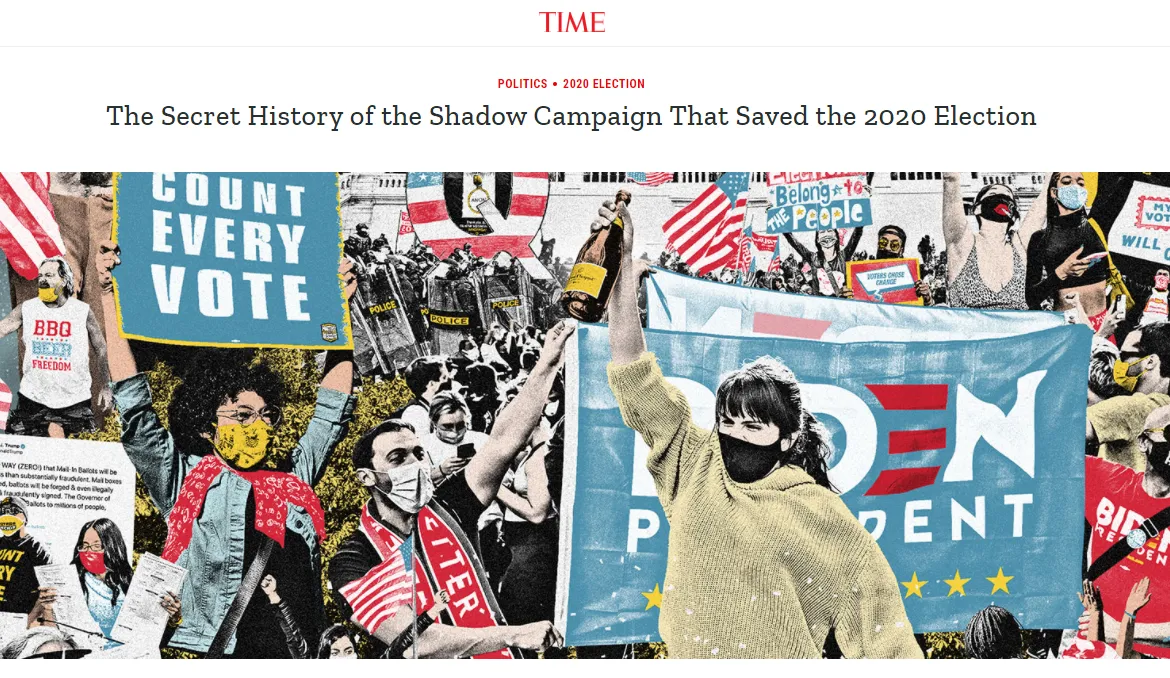Was the election stolen? No.
But it was stacked against Trump.
This has been observed in such ways as the double standard in how media and tech companies have censored political voices. More concrete, we have the recent (and surprisingly open) feature article in Time magazine, which says of the 2020 election…
“There was a conspiracy unfolding behind the scenes … an informal alliance between left-wing activists and business titans … a well-funded cabal of powerful people … working together behind the scenes to influence perceptions, change rules and laws, steer media coverage and control the flow of information.”

https://time.com/5936036/secret-2020-election-campaign
In 2016 practically all major social institutions were general against Trump—media, academia, Wall Street, entertainment, Big Tech, etc. Trump won anyway. In 2020, they just went a little further to make sure it didn’t happen again.
But why would Time magazine—a member of these anti-Trump forces—so openly share this plan?
Because they don't view this as shadowy conspirators menacingly manipulating an election. They see it all more like the Manhattan Project, the top-secret building of the A-bomb to win the war. They see this “well-funded cabal” trying to shape the 2020 election as heroes behind the scenes working hard to save the country.
Specifically, the Time article describes these efforts as working to protect the election, “ensuring it would be free and fair….”, not to necessarily stop Trump from winning. But we know the motivation was to help Biden, just as we know Republicans have used the same language about “free and fair elections” as rationalization for trying to help Trump make up his deficits following election day.
So with all this, we can move past the argument about whether the election was literally stolen. Instead, we can meet in the middle to agree the election was manipulated—and then from here, debate whether THIS was the right thing to do.
It's a vitally important discussion to have because there’s merit to both sides.
Trump was a lot of bad.
It’s also a lot of bad when a few have the power to counter the will of the many.
Such a discussion of the people vs. the powerful is universal in application.
But here's the kicker: Most of the country isn't going to have this discussion, because we are indeed so polarized. This Time article, then, is now being used as fuel for the well-stoked flames of ideological partisanship.
One side, feeling cheated in this election, will now view Trump even more like a heroic victim taken down by the powerful, harmful people he tried to fight—people this side now sees as publicly gloating about their scheming.
The other side will minimize such concerns and, in fact, praise this particular outsized influence of the powerful.
(Side note: Notice the “backwardness” of these positions? It’s the conservative side claiming to be fighting for “the people”, and the liberal side now defending the influence of the rich and powerful. This same ideological switcheroo is seen in the debate over private tech companies censoring conservative voices, where it’s those conservatives who wish to restrict free market activity and liberals defending the heavy-handedness of corporations. This backwardness is both a sign and a cause of the social bind we’re in.)
In all, this Time article will just serve to further (even accelerate) the divide in the country.
While one side feels the voting process is rigged because they didn’t get their way, the other is turning their heads to social manipulation from the elite because they did get their way.
It’s just another step along this path of social uneasiness and institutional breakdown.
Be prepared.
Buy bitcoin.
